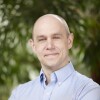Indistinguishable from Magic: Communicating Science
Photo courtesy of Hyun-Joo Kim.
“Any sufficiently advanced technology is indistinguishable from magic.” - Arthur C. Clarke
For me, this still speaks volumes about what it’s like to communicate physics. Physics problems are seemingly either impossible or straightforward, depending on if I understand them. The learning curve can be quite sharp and, if you’ve ever tutored before, I’m sure you’ve seen this same feeling manifest in those working on their introductory physics homework problems. One of the most common phrases I’ve heard is that the student knew the material, but the problems were impossible.
To be fair, I’ve felt that way more times than I can count. If you showed me the solution to an impossible problem, I could explain every step, but struggled to get there by myself... it’s frustrating to feel like you know what’s going on but also feel hopelessly lost, all at the same time. And then, after hours of not understanding anything at all—with a frustration level to match—the problem would click into place. Not because I looked up the solution in a textbook, but because I asked lots of questions, debated every step, and made every mistake possible, in concert with my colleagues and friends. This kind of thoughtful, earnest communication is one of the hardest things to learn, but possibly the most important skill a physicist can have in their repertoire.
It is through communicating science to others, in all of the available forms, that we truly learn a topic and remember the reasons many of us became scientists: the excitement of discovery and the desire to know why. Science is meant to be shared, discussed, and debated... together. Yet, scientific discovery is messy, difficult, and seemingly impossible most of the time.
Sometimes, after I had solved a problem, having looked at it from every viewpoint, answered every question someone could pose about the assumptions, established boundary conditions, and considered every limiting case, I felt as if I was holding the problem in my mind and could truly appreciate its different facets. This deep knowledge is hard to come by, but one way to make it easier is to explain the topic to others. Even after having taught a course for many years, I could be showing a demonstration and someone else’s fresh perspective could make me feel like I’d never looked at the problem in the right way. A new facet. This is how discoveries are made and true experts in a topic emerge. We are better researchers and scientists when we communicate with and, more appropriately, teach each other.
Fresh perspectives have led to complete changes within the field. This can take the form of making extensions that have never been made, such as de Broglie’s theory of electron waves, or proposing an idea so outside the normal mode of thinking that it seems like magic—Einstein’s quantum theory of light. It can also be the incremental, but monumental little ventures in reasoning that enable entire new fields; quantum mechanics is an excellent example. We learn as a community: the act of communicating science has led to breakthroughs. Not only do we make our understanding of our field more complete, but we get a little bit closer to the amazing breakthroughs yet to come. //
----------------------
1. de Broglie, Louis, On the Theory of Quanta: Recherches Sur La the´ Orie Des Quanta, Ann. de Phys., 10e serie, ´ t. III (Janvier-Fevrier, 1925).
2. Rigden, John S., Einstein 1905, The Standard of Greatness (Harvard University Press, 2005).




